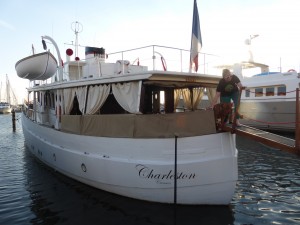
Chris and I just returned from our holiday in the French Riviera, and it was just what we needed. Beautiful beaches, some genuine R&R lounging on the sand or boat deck, spectacular views, and exploring new places.
During the 10-day trip that took us from east to west and back again, we stayed in a variety of lodging options, even enjoying our first experience with airbnb. From the familiarities of youth hostels to a splurge night in a fancy hotel, this trip saw us from rags to riches.
How do the lodging options stack up?
To help make your next trip as comfortable as possible, I’m listing my pros and cons of each option we used. Let us know in the comments what type of lodging you think would best fit your travel style.

Hostels
After Chris tried to take me to my first hostel in NYC in 2007, I vowed I would never stay try to stay at another one. We had a terrible experience with the Hosteling International one there, and I swore them off. (To this day, I still try to only stay at non-HI hostels, if possible. Let’s just say the customer service was beyond atrocious.)
It wasn’t until we moved abroad in 2012 that Chris was finally able to take to me for my first stay in a locally-owned hostel in Foz de Iguaçu, Brazil. I loved it. We met so many travelers from all over the world, and we just had a German couple we met at the hostel come here to Switzerland for a visit a few weeks ago. Now whenever we’re abroad, I prefer staying in hostels.
Pros
-Very affordable, in Europe normally running between 15 and 30 USD per night (of course, except in Switzerland where they run about 60 USD) and even cheaper in South America and Asia.
-Meet new people from all over the globe with who you typically can go out exploring the city. Swapping travel stories and finding out the latest news on destinations is just part of the great experience of meeting other travelers.
-Most have full kitchens available for personal use, so it’s always very easy to save money on food by cooking for yourself.
-Restaurants/Bars also are very common in hostels with good food at low prices and great drink specials.
-Common rooms are typically standard in hostels where you can access free Internet. Board games are usually available, and I really like the book exchange libraries in most.
-Many hostels provide excursions at an affordable additional charge. From dinner shows to scuba lessons, you can book the trip and the hostel makes sure everything is provided, including transportation to and from the location. Along with excursions, hostel staff are usually trained to provide you with the best tourist information. They know the non-crowded beaches to visit, the best nightclubs and more to recommend.
Cons
-Cleanliness. Hostels range from pristine to downright disgusting, depending on the staff. With so many people sharing beds and baths, it’s really up to how well the staff maintain the facilities. Always take shower shoes, and do a through search of your bed and linens.
-Little privacy. Though you can pay extra for a private room, it’s most common to book one bed (typically bunk bed) in a shared room from anywhere from two to upward of 20 beds (the largest room I’ve ever stayed in slept 24 people).
-Noise. With that many people sleeping in one room, you’re bound to have someone with some unusual night activity. I’ve heard everything from snoring to a guy cussing out his dream nemesis. I always sleep with my earplugs in, and that really cancels out most of the noise. If you stay at a hostel known for its party atmosphere, be prepared for thumping music and rambunctious young people until the wee hours of the morning.
-Lights. Though it’s an understood rule of courtesy in hostels that you don’t turn the lights on in a room where people are sleeping and you try to keep any noise to an absolute minimum, you’ll have some that just don’t abide. Those rambunctious partiers will come in drunk, waking you up. I find that my evil glares are usually enough to send them back out to the bar.
A few of our favorite hostels are Casa Garcia in Barcelona, Circus Hostel in Berlin, Han Tang Hostel in Xi’an, China, and Rio Hostel Ipanema in Rio de Janiero. We typically book through Hostelworld or HostelBookers. Always be sure to check out the reviews before you book.

Couchsurfing
When Chris first told me in 2011 about this crazy site that let strangers stay in other strangers home, I really thought he had lost it. Are you kidding me? I’m not letting some potential serial killer sleep in my guest bedroom across the hallway nor am I staying in some potential crazy person’s house.
It took some convincing, but he finally talked me into letting our first Couchsurfer stay with us in Virginia. Our guest was riding his bicycle from Maine to Florida, and I’m glad Chris did talk me into it. That first Couchsufer had so many stories about his travels and we spent hours talking. He opened us up to this whole new world of travelers, and we haven’t looked back.
Pros
-I’ve met some of the most interesting people by opening our home up to these travelers and by staying with “strangers.”
-If you’re surfing, your host can show you around the city and give you an insider’s perspective. In fact, most of the WorkLife Travel Destination posts interviews are with Couchsurfers who’ve hosted us.
-Even if you’re not surfing, you can request hosts to meetup for coffee or just give you some pointers for the city. There are also many Couchsurfing gatherings in cities across the world that you can attend.
-It’s free, but that doesn’t mean it’s free. In the true spirit of the concept, you should somehow pay your host’s hospitality forward by either hosting in your city or at least providing information to those traveling through.
Cons
-You’re always a guest. It can a bit intimidating and tiring constantly being on your best behavior, especially since is the first time you’ve been in your host’s home. Each host will also have a different style, some may be very easygoing while others are very strict.
-Cultural differences. Either a pro or a con, Couchsurfing can vary depending on where you are. We’ve noticed that when we Couchsurf in the States, your host will typically spend a dinner or some other social time with you and then you’re on your own. In Europe, though, the concept is much more hands-on. Your host will expect to be with you almost your entire visit, showing you around his city.
You can book or accept visits on the Couchsurfing website. Be sure to checkout the references of those you surf with and host, and always leave feedback for the rest of the community. Even if you can’t accept a Couchsurfer due to scheduling conflicts, be courteous and always reply.

airbnb
Though we’ve been on airbnb for about a year, this holiday was the first time we’ve actually used the service. We booked a two-night stay on a former 1940s-era French spyboat turned yacht. The Charleston was docked at a marina in Cap ‘D Agde, a beautiful port town with lots of fun in the sun to be had.
We had the captain’s room, the largest on the boat. From the deck, we could lounge and listen to the live music from across the boardwalk. The owner was a nice French gentleman who made sure we were comfortable, and his bulldog was such a lazy and fun friend to have aboard.
Pros
-There are more than 800,000 places worldwide to book. You can find unique lodging like our French yacht to a former schoolhouse in Canada.
-Home amenities like a full-service kitchen or use of a private pool.
-A host can either be available for your stay or you can choose a location that the owner is absent.
-Bookings can be made for a few days up to several months.
-All financial transactions take place online before you arrive – no need to pay anything upon arrival or departure.
Cons
-You’re again a guest, albeit a paying one, but this is still someone else’s home.
-Can be mildly expensive (but more affordable than a hotel) depending on the location. We paid about $110 USD per night for the yacht.
We haven’t had the chance to use airbnb as hosts, yet, but we hope to soon. From what we’ve seen, the payment process, both giving and receiving, work quite well and the booking software is easy to use.

Hotels
When we do splurge on traditional hotels, we typically stay three stars and above (sometimes less if we’re on an American road trip, picking up discount coupons at welcome centers). The boutique hotel we stayed at in Monaco during our holiday was definitely tipping the scales toward the five star.
With the best view I’ve ever had of the sea in our plush blue room, the Hôtel Le Roquebrune was certainly a pleasant deviation from our normal lodging.
Pros
-Cleanliness. If your shower isn’t clean or your linens aren’t stark white, you have every right to complain.
-Privacy. With your own room under lock and key, you can feel free to take advantage of the seclusion.
-Though the hotel may call you a “guest,” you’re freedom to relax is much more available than at other lodging options.
-Many higher class hotels offer extra amenities, like free bottles of water or cookies, in your room and have comfortable furnishings, such as down comforters and thread-count sheets.
Cons
-Cost. For all this extra comfort, expect to pay. For our one-night sanctuary by the sea, we paid about $300 USD.
-Hotel staff don’t typically have the inside information on the city. They can recommend nice restaurants and the typical tourist attractions, but they aren’t going to send you to the remote beaches or set you up on excursions.

Bed and Breakfasts
Chris and I stayed at our first B&B when we had just started dating while he was living in Georgia and I was in Kentucky. Most dates back then were spent traveling to a new place, and our first B&B experience was in Covington, Ken., right across the river from Cincinnati where we were attending the Tall Stacks Festival.
We were hooked from the start on the hospitality and history each unique B&B offers. From gourmet breakfasts to gracious hosts, B&Bs are a favorite lodging option.
Pros
-Gourmet breakfasts. Hosts are typically trained or have at least spent a lot of time in the kitchen coming up with fancy breakfast dishes like quiche Lorraine or French Toast cups and blueberries. Along with such a filling breakfast, warm cookies are baked in the afternoon and typically available to enjoy with coffee and tea in the sitting room.
-Meeting other guests. Breakfast is usually held at one dinning room table where you share seats with the others B&B guests. We’ve met some great people during these breakfasts, but just don’t expect to explore with them later like in a hostel. The clientele is quite a bit different.
-History. Historic homes usually serve as B&Bs, and the story behind the home is typically available in the common area. These homes many times have had famous guests and are listed on historical registries.
-Plush rooms. Each room has a different theme so you have plenty of options to meet your liking. As each room has its own lock, privacy is also a benefit.
-Gracious hosts. As part of the charm of the food and home, your hosts will talk with you at breakfast, having plenty of material for you to explore your location, and many amenities including bikes for a boardwalk ride, beach gear for an afternoon on the sand, and books for a quite mid-morning sitting in the cozy common room.
-Special packages. Weddings, anniversary trips, engagements – all these special occasions and more can be accommodated with special features at B&Bs. Chris and I attended a Halloween murder mystery dinner at a B&B in Maryland once.
Cons
-Pricey. Expect to pay upward of $150 a night for the most basic rooms in a B&B.
-Based on what you’re seeking, many B&Bs are made to be away from the city for a nice and peaceful stay. Unlike the other options, getting to public transportation may be an issue. Check with the host.

Home Stay
Though we haven’t ventured into this territory much, I wanted to mention it since I just read a blog post about a new platform, homestay.com, that helps you organize this type of lodging option where you live with a local family while immersing yourself in the culture.
We experienced this a bit during our volunteer trip to Morocco, and it was an extraordinary experience I would love to do again one day.
Pros
-No better way to immerse yourself into a culture.
-Truly become part of the household, helping with chores and partaking in celebrations.
-Hosts help you immensely with learning the city and teaching you about the culture.
Cons
-I wouldn’t recommend a home stay if you’re just looking to relax. Though your host typically won’t take advantage of the situation, you will be expected to pitch in and do your share.
What is the best lodging option for you?
So, what do you think? Where are you most likely to stay on your next trip? In a more affordable but less comfortable hostel or vice-versa in a hotel or B&B, or are you willing to be more daring and try out airbnb, Couchsurfing or a home stay?
-Monica
